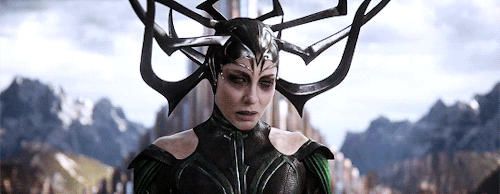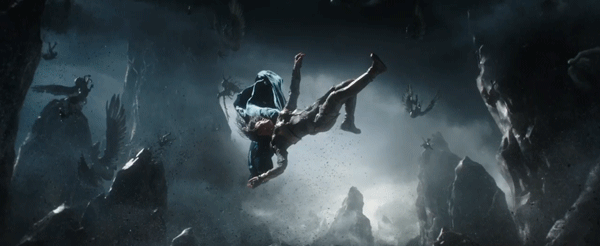Thor: Ragnarok's score is an 80s-tinged cosmic funk fest and Marvel should be taking notes.
Something remarkable happened during Thor Ragnarok. Well, a lot of remarkable things happened. Anthony Hopkins flaunted his criminally under-utilized comedy chops. Taika Waititi folded a postcolonial perspective into a superhero blockbuster. We all learned what "get help" is.But, more to the point, there was something remarkable about Ragnarok's score: I noticed it. I left the theatre with 80s electro trills massaging my skull. When I turned to my friend during the end credits and said "I really liked the music" I didn't mean the kick-ass use of "Immigrant Song." I meant the original soundtrack.
Mjolnir to my head I couldn't even pretend to hum a score from a Marvel movie. Sure, I know the tracklists to Awesome Mix Vol. 1 and 2 by heart—but what the fuck does "The Final Battle Begins" sound like? Or "Showtime, A-holes"? Those are the most popular songs from the Guardian's OSTs on Spotify and I couldn't tell you a damn thing about them. They could have wind chimes in them for all I know.
The Marvel Cinematic Universe is the highest-grossing franchise in film history. Why is their music so forgettable? Last year, the folks at Every Frame a Painting made a compelling case that Marvel's indistinct music is the product of Hollywood's systemic aversion to risk-taking; that they prefer to play it safe, sacrificing emotional richness for the bland and inoffensive. And, unsurprisingly, people don't remember safe choices designed to fade into the background.
As Every Frame's consummate narrator (and fellow Vancouverite) Tony Zhou explains, modern blockbusters are typically composed through a process that begins, and unfortunately tends to end, with "temp music": tracks from other films that are used as a temporary reference during the editing process. While the idea is that temp music will eventually be replaced by the original score, in reality, filmmakers will often ask composers to closely imitate the temp, having grown attached to it or simply wanting to play it safe. The result is a vaguely incestuous orchestral landscape: a musical eternal return of the same that is fundamentally forgettable.
But this wasn't the case with Ragnarok's score, which was composed by the adept polymath Mark Mothersbaugh. Astute readers might recognize Mothersbaugh as the frontman of DEVO, or more relevantly, as the man behind the scores of everything from Pee-Wee's Playhouse to The Lego Movie. In a fun twist of fate, Mothersbaugh was aware of the Every Frame a Painting video essay when he was tasked with Ragnarok, and actively committed himself to making a memorable Marvel score; to "respect the world we were in [and] maybe bring some new creative material to that world."
Considering his long-time collaboration with the king of quirk Wes Anderson, Mothersbaugh's partnership with independent dynamo Taika Waititi is a perfect fit. Inverse Entertainment's Ryan Britt—rightfully arguing that Ragnarok's memorable funkiness is in large part to Mothersbaugh's credit—suggests that you can sniff out the genesis of Ragnarok's soundtrack in The Life Aquatic's "Ping Island," a multifaceted synth track that gradually unfolds into large-scale orchestral bombast. Mothersbaugh himself called Ragnarok's score "a cross between the world of Wes Anderson and the world of Thor as we have known it in the past"; a combination of the eccentric and the familiar.
Ragnarok's score is a gasoline stain of Mothersbaugh's prowess and Waititi's fiercely distinct creative vision. "[Waititi] gave me a box of music mixes of things that he was listening to," recalled Mothersbaugh in an interview with Collider. "None of them had anything to do with big orchestra music [and] I was listening to those tapes and going, 'how do we bring those ideas into the Marvel world?"
In its most evocative moments, Ragnarok manages to tick requisite boxes while doing new, interesting, and noticeable things with its musical topography; most markedly, pairing vintage DEVO synth keyboards with the big sound of a 100-piece orchestra. The synths, for me anyway, acted as a kind of musical foothold; I could pick them out and live in them while Tessa Thompson punched spaceships out of the sky. It's not that Ragnarok's synths weren't as technically or thematically complex as the more traditional orchestral elements—it's more that their foregrounded presence was an unexpected and delightful surprise.
 What if feels like to listen to Ragnarok's OST
What if feels like to listen to Ragnarok's OST"Thor: Ragnarok," which accompanies the film's Saturday morning cartoon title card, is probably the best example of Mothersbaugh's interlacing of the orchestral and the synthetic. A rolling electronic phrase is introduced with Phil Collins drums, which is frankly the only way to introduce anything. It is then swept up in traditional horns and strings, and finally crescendos into melodic electro-guitar wails and a triumphant, amassed iteration of the persisting electronic phrase. It's the Netflix intro you never skip. It's both foreign and familiar at the same time; a nostalgic aftertaste that's too alien to feel pandering. It's glorious in the proper sense of the word.
Contortions of the rolling phrase in "Thor: Ragnarok" appear throughout the OST, but perhaps most interestingly to signal Hela's introduction in "Twilight of the Gods," its original measured and unique determination replaced by a jagged, traditional, and frantic set of strings. Tellingly, synthetic instruments are markedly absent in pieces relating to Hela, which instead offer an intimidating march of chorals and drums. Hela's pieces come across as imperial and tonally combative when compared with the joyously funky tone of songs associated with Thor and the gang. Which, given Hela's penchant for violently colonizing everything the strobe light touches, is quite fitting.

In other words, Ragnarok's use of alien disco synths isn't just weird and fun for the sake of being weird and fun, it serves a larger narrative purpose. In addition to everything else, Hela's invasion takes place on a musical level; a forceful extermination of an independent strain. As in the narrative, so in the score: Thor's songs make room for both the traditional and the alien; Hela's do not.
Rather than being sequestered or overshadowed Ragnarok's score is brought to the fore in a way we're meant to notice. It's allowed to breathe, to take up space, and to inform Ragnarok's weird and wonderful world as much as a color scheme, costume, or line of dialogue. The idea that original soundtracks are meant to fade into the background like air-conditioners is wildly baffling. Scores have a uniquely lingering quality; they can follow you home, they can make you tap your foot, they can root a film in a feeling. That is…if they're given the opportunity to do so.
Thor: Ragnarok is now playing in theaters. Its Original Motion Picture Soundtrack is available in digital and hard copy format at retailers like Amazon and can be streamed on Spotify.
The article Why 'Thor: Ragnarok' Proves There's Hope for Marvel's Forgettable Score Problem appeared first on Film School Rejects.
Original Post: https://droolindog.net/2017/11/20/why-thor-ragnarok-proves-theres-hope-for-marvels-forgettable-score-problem/
Tags: > Music+ | #Entertainment, IndieBrew

No comments:
Post a Comment